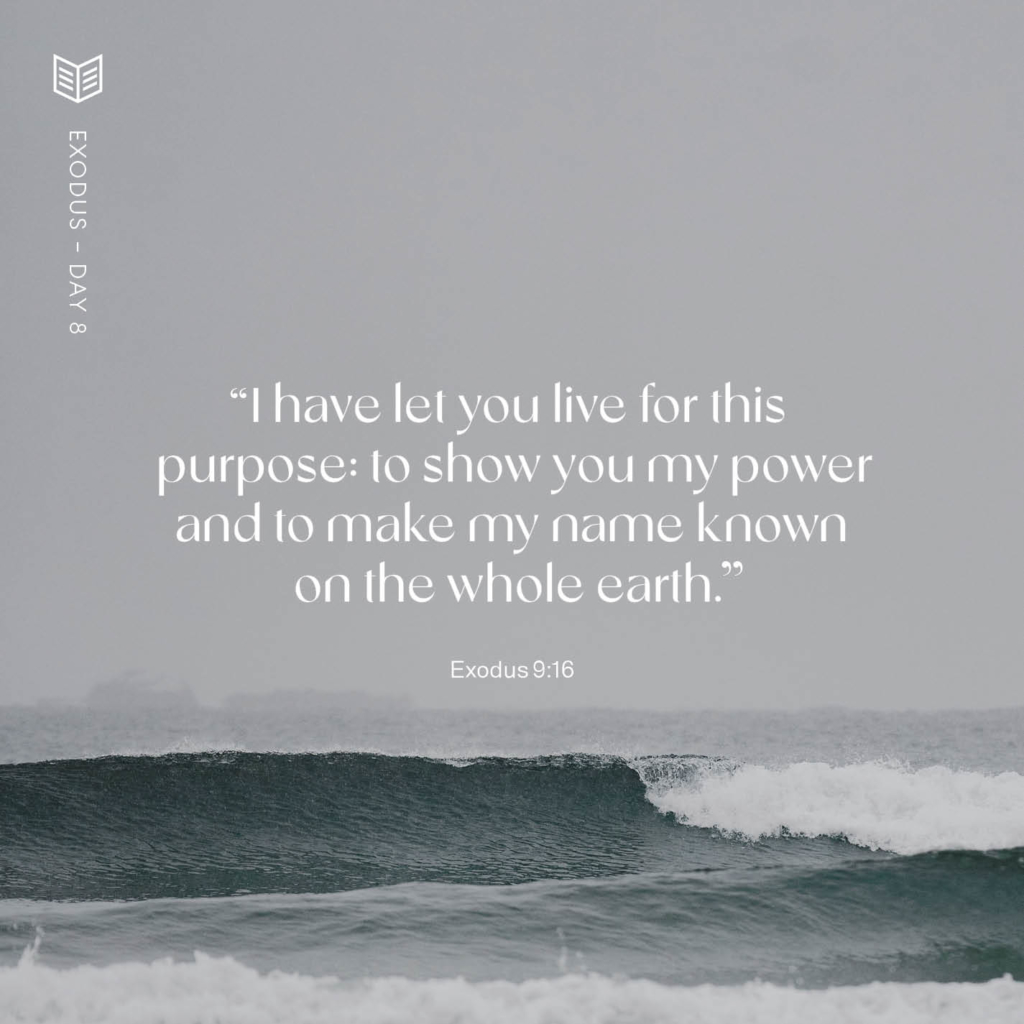Pharaoh’s Resistance to God
Open Your Bible
Exodus 9:13-35, Exodus 10:1-20, Romans 9:14-24
BY Melanie Rainer
One of the biggest fights my husband and I have ever had was over a bug.
Not just any bug, but a big fat bumblebee. We were driving the Blue Ridge Parkway outside of Asheville, North Carolina, after a day of hiking waterfalls with his brother. Mountains all around, crisp air, blue skies. It was nearly perfect—until a bumblebee flew up from under my seat, and I started shrieking. “Pull over right now!” I shouted, as he kept driving.
Realistically, there was nowhere to pull over. We were driving winding mountain roads with no shoulder. I was panicking, and there was nothing he could do (except match my pitch and yell at me to calm down). Finally, a scenic overlook saved us. But my nerves were shot, and my brother-in-law had witnessed a “real marriage moment.”
I can’t read Exodus 7 and 8 without cringing. Frogs, gnats, flies, and a river of blood just sound gross. This is one of those passages that I try to skim over without putting myself in the scene: piles of dead frogs that filled the land with stench, and then “all the dust of the earth became gnats” (Exodus 8:17). Is your skin crawling? Mine is.
The panic I felt driving down that mountain road, while feeling hunted by a hungry bumblebee, was probably nothing compared to the terror of being swarmed by flies, gnats, and frogs. In these pages from Exodus, Pharaoh goes back and forth in his response to God, who pulls back the plagues, hardens Pharaoh’s heart, and then sends an even worse plague. Sometimes the plagues are universal, affecting the Israelites in tandem with the Egyptians. Others, like the swarms of flies, are directed only at the Egyptians, while sparing the Israelites as only God can do.
The Egyptians believed that their gods controlled the very things that God commanded in the plagues. During the first three plagues, the magicians of Egypt call upon their gods to mimic what Moses and Aaron were doing. During the plague of the gnats, the magicians could not replicate the work of God. “For the LORD is a great God, a great King above all gods” (Psalm 95:3). There is none like Him (Psalm 86:8).
The meta-narrative of Exodus reveals God’s character to His people: He “is compassionate and gracious…slow to anger and abounding in faithful love and truth” (Exodus 34:6–7). The plagues serve to pull back and reveal another aspect of God’s character. He demonstrates His authority over the earth, over the plants and animals, over His people, over all things.
Eventually, the plagues work; Pharaoh relents, and the Israelites are freed. God has rescued His people, but He has also shown them that He can be trusted, that He is in their corner, and that He has all authority in heaven and earth.
Hundreds of years later, God would come to earth as a man and again reveal His authority through a series of miracles—calming the sea, healing the sick, raising the dead—that showed His people and the watching world that He alone is God. We can still sit in awe of His power today.

53 thoughts on "Pharaoh’s Resistance to God"
-
YES!!!! This! ❤️❤️❤️
-
Amen
-
Yes,Amy, I have struggled with this concept in the past— why did his heart need to be hardened? This time reading though I stopped where it says God told the people of Egypt to get out of the way of the hail— giving all a chance to believe and trust Him, as He continues to do today. I’ve realized the bigger plan is the reason for hardening hearts of people like pharaoh (and others referred to in the NT). Because these hearts were hardened God was able to do what was necessary to gain the Israelites trust, and ultimately, bring salvation to the world. I’m so thankful we serve a God that is able to see the full picture and we can trust has our needs in mind, even when we can’t see or understand it.
-
The podcast had a great segment about how God does not actively harden a persons heart but that when people experience God they can either accept or reject his authority. Clearly, pharaoh rejected God’s authority and therefore his heart was hardened. But then in Exodus 10:1, the Lord says he hardened pharaoh’s heart so that he could do signs and wonders. This doesn’t sound like pharaoh’s heart just hardened in response to God but that God actually hardened it. But then the scripture from Romans 9 helped clarify the meaning. God placed pharaoh in his position at that time knowing his heart. So he knew his heart would harden when he experienced the work of God. He knew that pharaoh’s hardened heart would give Him opportunity to show wonders to the people and demonstrate his power.
-
This has definitely been a “God please help me” day…..
-
Today’s reading also makes me reflect on how God has shown me that He can be trusted, that He is in my corner, and that He has all authority in heaven and earth?!
-
Amen Kaity! This crossed my mind during reading also! Help us Lord!
-
I don’t want to be like Pharaoh, saying I repent, promising to change, when things get hard and I’m feeling the consequences of my sin. And then changing my mind and going back to my old ways when things get easier/better. I choose to serve and repent and follow regardless of my circumstances.



Post Comments (53)